Welsh rock band The Alarm adopted within the footsteps of their pals U2, rising out of the fertile late 70s UK put up punk scene to among the world’s largest levels earlier than acrimoniously splitting within the early Nineties. However for frontman Mike Peters, it was a most cancers prognosis in 1996 that will change his life eternally.
It’s 1996. The M1 glints by, measured in concrete stanchions and distant cities. At the back of a individuals service taking him to play an acoustic present in South Shields, Mike Peters feels a lump in his collar-bone. He pushes it tentatively and the small ball strikes up over the bone. He presses it once more and it slides downwards. He strikes his hand away and it resumes its unique place, an unmoving bulge in his pores and skin.
“I believed it was my lymph glands,” says Peters. “So I had a blood take a look at. I used to be with the physician, and I might see this piece of paper on the desk, and it had the phrase ‘most cancers’ written throughout it. He stated: ‘I believe you’ve received a 50/50 probability of creating it, and also you won’t need to inform your spouse due to how unhealthy it’s.’”
The medical doctors identified him with non-Hodgkin’s lymphoma. Peters says he has by no means been so scared in his life. However a couple of months later, following contact with a religion healer, the most cancers went into spontaneous remission. Nobody knew why. Peters thought he was freed from it eternally.
He was again on tour in 2006 when the most cancers returned. One morning after a present and some beers, he awakened with an erection that despatched a ache taking pictures by his torso. The ache lasted for hours. The following time he took a drink, the identical factor occurred. He went again to see the identical physician, the one who had warned him that he would possibly go into shock on the information of most cancers 10 years earlier than. This time it was physician’s flip to look ashen.
“His face turned white,” says Peters. “He stated my liver and spleen had been enlarged, and I knew right away that it had come again. I had leukaemia. To be dragged again in was horrible.”
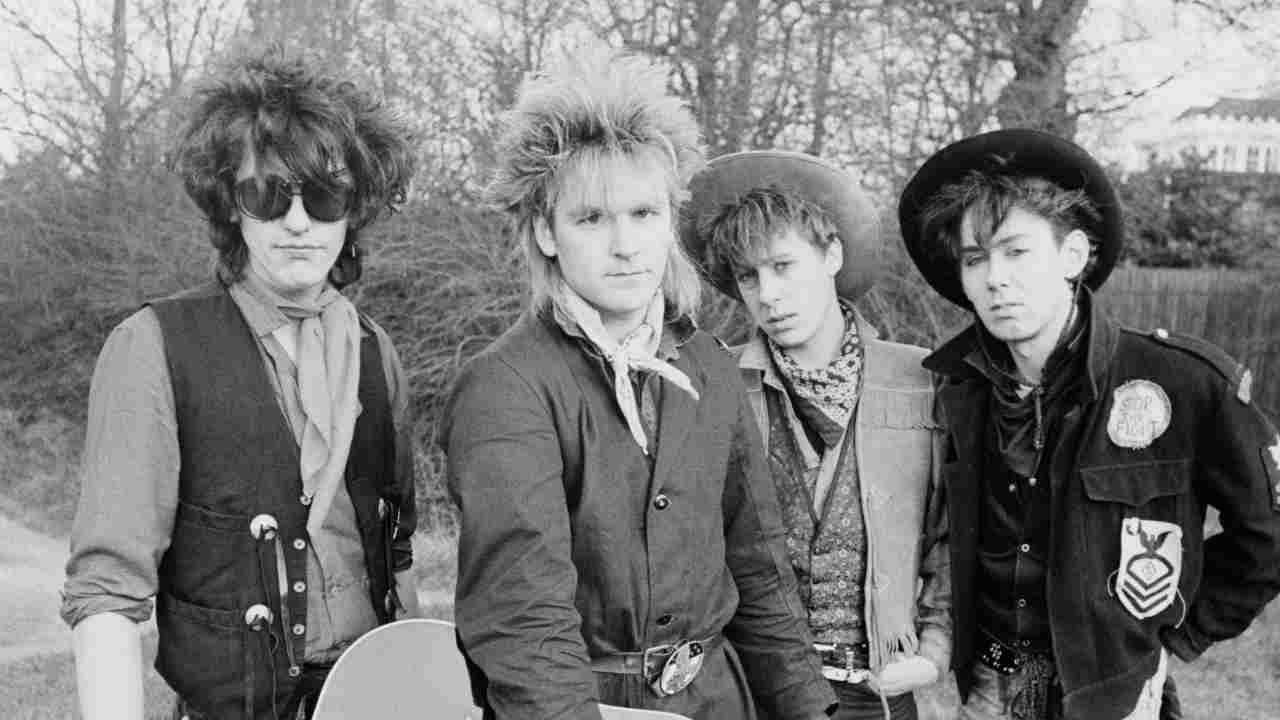
It’s afternoon available in the market city of Welshpool. In a studio a couple of miles down the highway, Peters and the most recent incarnation of The Alarm – the band he has fronted on and off for the reason that early 80s – are recording The Sound And The Fury, an album of re-workings of among the band’s songs that the singer feels may need slipped by the cracks.
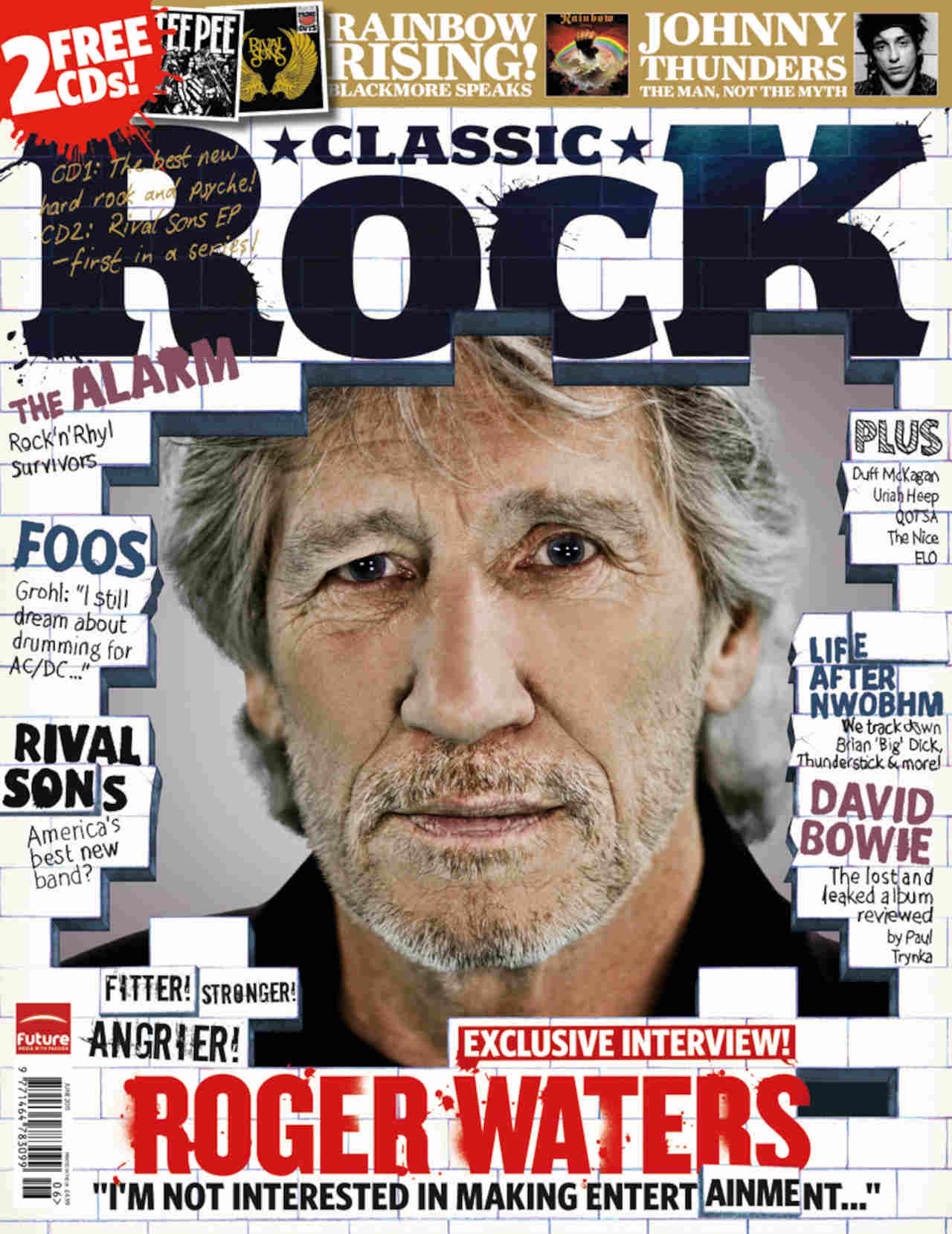
For a person who has stared down loss of life twice and remains to be present process remedy for his most up-to-date most cancers, Peters appears remarkably nicely, with a thatch of blond hair and some traces round that acquainted grin. The exploding mullet and cowboy shirt have gone, however he nonetheless appears like that bloke who sings in The Alarm. Actually a rock’n’roll survivor, it says a lot about his sense of humour that, within the early days of the twenty first century, he shaped a band referred to as Useless Males Strolling with Spear Of Future’s Kirk Brandon, the Damned’s Captain Wise and Pete Wylie of The Mighty Wah!.
For many individuals, The Alarm blew up after they carried out what proved to be their breakthrough single, Sixty Eight Weapons, on High Of The Pops. It was September 1983 and the band had flown in from America simply to file the present. Musically tight from months on the highway, their efficiency propelled the track into the High 20. For the remainder of that decade, their call-to-arms anthems and unashamed politicking earned them an avid fan-base that also travels the world to catch them – in addition to the derision of the British music press. Stirring albums similar to 1984’s Declaration and the next yr’s Power tapped into the socio-political vibe being meted out by their musical friends U2, Easy Minds and Large Nation. The Alarm’s statements had been daring and filled with bravura; they sang of a future; they sounded hopeful, if typically dismayed.
The story of The Alarm actually begins seven years earlier, in 1976, within the fading Welsh seaside city of Rhyl. The 17-year-old Peters lived in a home on Edward Henry Road; future Alarm bassist Eddie Macdonald grew up two doorways down. Peters had purchased an acoustic guitar as a child, as a result of Dylan performed one and since they had been cheaper than an electrical. He listened to The Who and the Stones. Native leisure was restricted to the odd seafront efficiency by Mud, so Peters needed to look additional afield. He noticed Sabbath at Birmingham Odeon ,and drove to London to see Bowie (Peters nodded off within the automotive park and slept by the complete present). He noticed the Intercourse Pistols play Chester in 1976, and the Conflict on the White Riot tour the next yr. The Pistols made him need to play; the Conflict confirmed him find out how to gown.
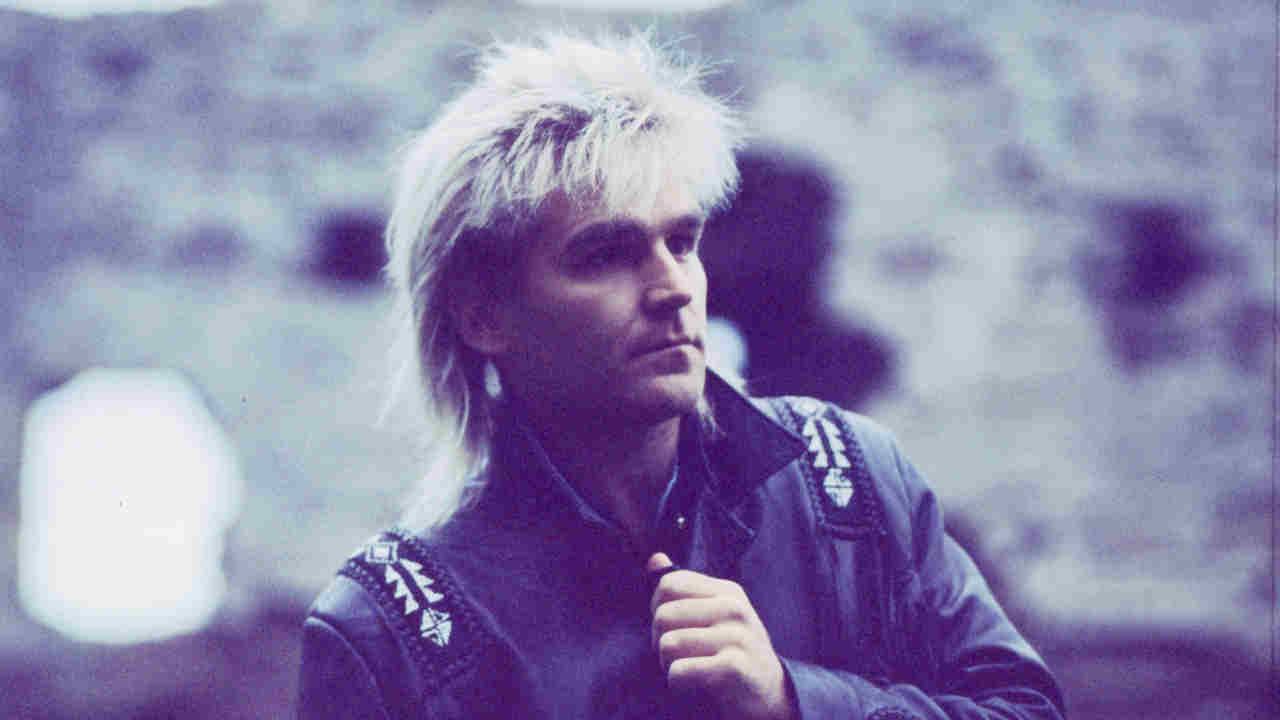
“I got here again from that and determined to be a punk,” he says. “However I used to be fats, and I knew I needed to drop pounds to be a punk.”
By early 1977, Peters and Macdonald had their very own punk group, the Bogs. They mutated right into a mod band, Seventeen. That very same yr, they had been joined by guitarist Dave Sharp and drummer Nigel Twist, each from the sadly monikered Quasimodo. Sharp and Twist had been collectively in a band of their house city of Manchester. The drummer moved to Wales together with his household, and the guitarist visited to play with him when he was on depart from the Service provider Navy. As Seventeen, the four-piece launched a single (1980’s Don’t Let Go), and toured with the Stray Cats, earlier than quickly splitting after which re-forming with a brand new title: The Alarm.
It was in 1981 that the band went from a standing begin to a dash. In June they performed their first present as The Alarm, on the Victoria Lodge in close by Prestatyn. A couple of months later they recorded their debut single, Unsafe Constructing, a ringing acoustic monitor that constructed to a thrumming refrain, with Peters’s plaintive and heartfelt vocal on high.
Conscious {that a} band couldn’t survive for too lengthy in Rhyl alone, they knew they needed to transfer their base to a much bigger metropolis. Their choices had been chilly, post-punk Manchester, or glamorous, rock’n’roll London. They selected the latter. A good friend lived south of the Thames in Battersea; by September the 4 of them had been dwelling on his ground, scratching round for gigs and watching their financial savings fade into oblivion. They had been there to work, although. Nobody talked about turning again.
The Alarm had one different good friend in London. Louis Parker was a Welsh nightclub entrepreneur-turned-promoter (he went on to e book Nirvana’s first gig within the UK; he died from most cancers in 2000). When Peters referred to as him, Parker handed on the variety of The Fall’s supervisor for Peters to attempt to get on the invoice at their subsequent present.
“I received by,” says Peters, “and this voice requested if we had been something like The Fall. I admitted we weren’t, they usually went: ‘Nice! We hate bands that sound like The Fall.’ We received the gig at The Venue in south London.”
A promoter from the London company Wasted Expertise turned as much as the present to expressly inform them to please cease bothering her with demo tapes and cellphone calls. Blown away by what she noticed when The Alarm performed, the promoter collared the band after their set to purchase them drinks. Regardless of her unique plans, she by no means as soon as talked about that they need to depart her alone.
The Alarm had been had been 4 gigs previous when the breakthrough got here. On December 19, 1981 they performed a showcase at subterranean London membership the Rock Backyard. To The Alarm’s shock, the place was rammed; The Remedy’s Robert Smith was by the bar subsequent to a string of A&R males, managers and music business executives. Amongst them stood Ian Wilson, agent for the then-rising Irish rockers U2. The Alarm performed with their hearts of their mouths, completed their set, staggered off stage and went again to their dressing room. Whereas the promoter saved a string of impressed file label sorts exterior the door, Ian Wilson advised the band how a lot he’d prefer to work with them.
And he was true to his phrase. On December 22, their cellphone rang. It was Wilson.
“We had been packing for the journey house for Christmas,” says Peters, “and Ian went: ‘Wish to play with U2 tonight?’ We had this coverage that we wouldn’t assist anybody any extra, so I stated no. Nigel, thank God, grabbed the cellphone, and stated: ‘In fact we’ll play with U2, Ian!’”
That night time at London’s Lyceum theatre, Bono watched The Alarm’s set from the aspect of the stage. Later he purchased them drinks and advised them how a lot he favored what they did. Unwittingly, they had been making pals in excessive locations.
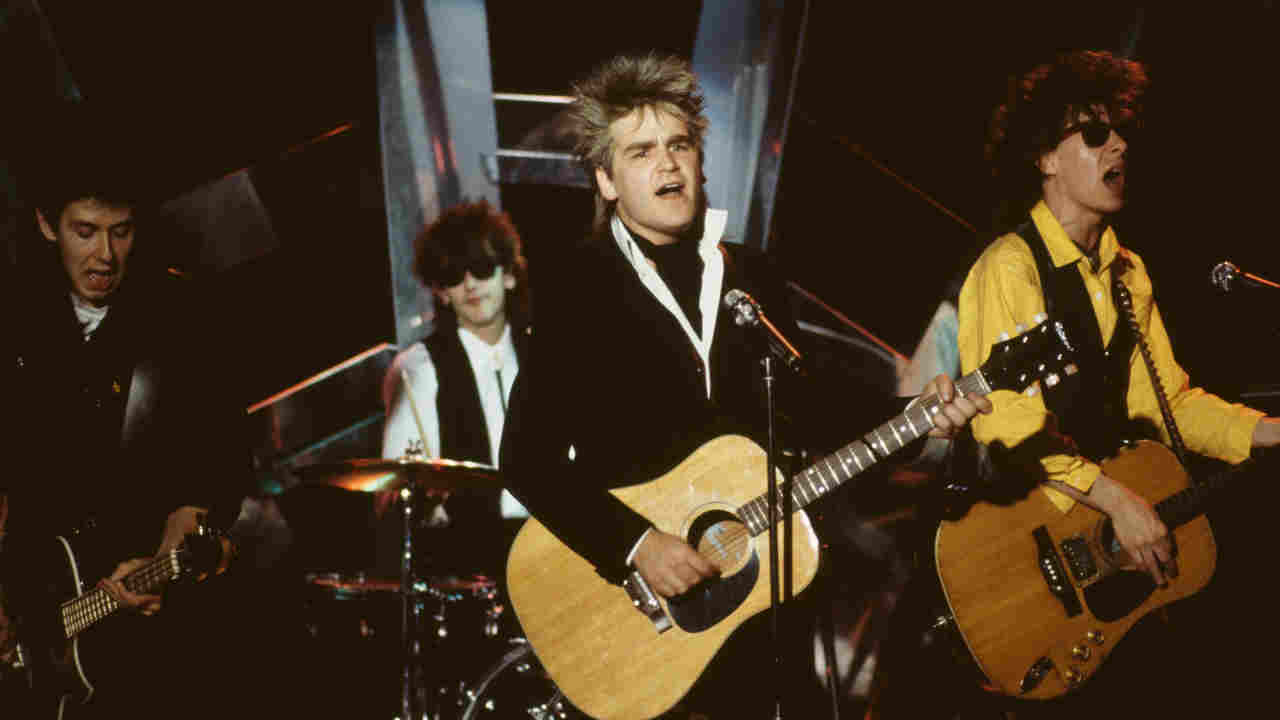
After the thrill of 1981, 1982 dawdled. The Alarm spent the yr having their demos rejected by one label after one other. Ian Wilson, by now their supervisor, despatched them out on the highway with anybody who would have them: Boomtown Rats, The Jam, Dexy’s Midnight Runners. It saved them busy.
Their break got here by way of their pals in U2. The Irish band’s administration had been attempting to persuade U2 that yet another American leg of their Warfare tour would make them stars within the US They’d do it, the band stated, so long as they might take out somebody they favored as assist. Which was The Alarm’s cue.
“Our first present was in San Francisco on the Civic,” says Peters. “Our rent truck had a 50mph limiter on it, so we received there late. Bono and The Edge met us on the door and helped us hump our gear in. I can bear in mind a fan going: ‘That roadie appears like Bono!’ That they had their caps pulled down, however they had been throwing our gear up on stage.”
And so started The Alarm’s love affair with America, albeit one-sided at first. Whereas they triumphed on U2’s Warfare tour, they nonetheless needed to put in weeks opening for US artists similar to Pat Benatar. “It was powerful taking part in to baseball and cowboy hats who solely favored 70s rock,” recollects Peters. “Punk hadn’t occurred in these components of America. However Iggy was from there, the Ramones, the New York Dolls. So there was an viewers. You simply needed to discover them.”
“They appeared so sincere and laborious working from a distance,” says Billy Duffy, a post-punk peer of Peters’s in Loss of life Cult (a revamped model of the sooner Southern Loss of life Cult), who would rework into The Cult (at the moment getting ready to impress themselves on a brand new era of followers at this yr’s Obtain competition). “Like us they had been punk followers who learnt to play their devices and had been looking for one thing to fill that vacuum left by punk. They regarded west for inspiration.”
Again within the UK, Unsafe Constructing and follow-up singles Marching On and The Stand hadn’t anxious the charts unduly. However The Alarm’s inventory within the US was rocketing. In September 1983 they headlined two nights on the Ritz in New York, and Bono joined them on stage. After they received again to London a couple of days later, women screamed at Peters on the street and requested for his autograph. He didn’t, certainly one of them advised him, sound American in any respect.

Remarkably, whereas they’d lastly bagged a take care of IRS Information, they hadn’t even recorded an album but. However after they ultimately did, their debut, Declaration (1984) and the next Power and Eye Of The Hurricane would chart on either side of the Atlantic, finally promoting 5 million copies between them. When the band teamed up with MTV in April 1986 to carry out one of many first exhibits to be broadcast reside throughout America, on the UCLA campus in Los Angeles, greater than 25,000 individuals turned up, a barrier collapsed, and the band virtually missed the satellite tv for pc hovering overhead.
That summer season The Alarm had been again in London to assist Queen at Wembley Stadium. However what ought to have been a celebration was, in Peters’s phrases, “bizarre”. Drummer Nigel Twist had spent the night time earlier than out on the tiles with INXS frontman Michael Hutchence, and had arrived house solely moments earlier than the band had been as a result of choose him up. Twist was compelled right into a bathe and fed espresso; he nonetheless missed some photographs throughout what was the most important present band had ever performed within the UK. Peters admits that he couldn’t assist however resent him.
And, someway, regardless of their rising success, The Alarm nonetheless had no cash.
“I bear in mind going to the outlet within the wall after the Wembley present, and the crew guys had extra cash than us,” says Peters. “You’d get house and have dad and mom and pals going: ‘You’re rock stars, why are you broke?’”
When the band convened a couple of weeks later to start out work on Eye Of The Hurricane, the strains had been starting to indicate. Sharp and Twist advised Peters and Macdonald that they wouldn’t file songs the singer and bassist had written; they needed to begin writing collectively as a unit. It was a stand-off that lasted a yr.
Two camps had been forming: Peters and Macdonald in a single, Sharp and Twist within the different. They barely talked to one another. When Sharp grew to become obsessed with Stevie Ray Vaughan after The Alarm supported the Texan guitarist, blues licks started showing in reside variations of Sixty Eight Weapons and Marching On. Peters requested him to cease; the guitarist resisted.
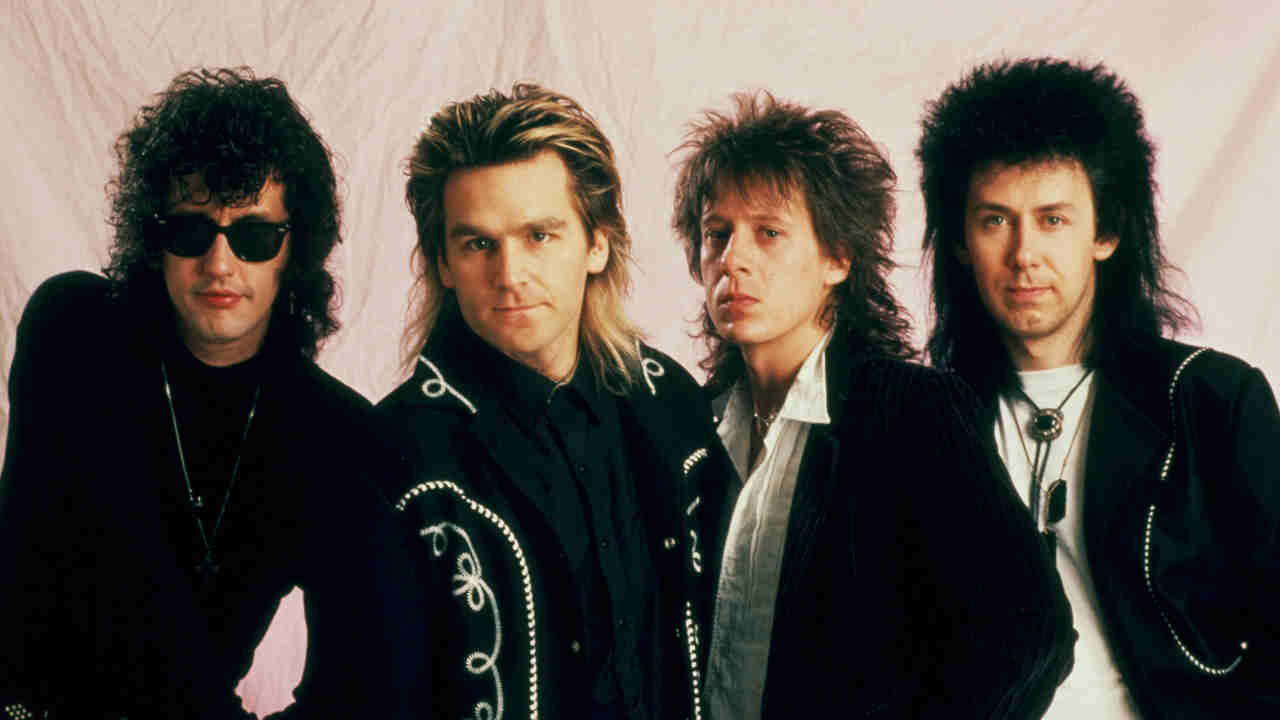
To the surface world The Alarm had been flying excessive. They spent the summer season of 1987 supporting Bob Dylan, who invited Peters up on stage to carry out Knockin’ On Heaven’s Door (“It was cheek to cheek with Dylan,” Peters recollects. “Superb.”). Jack Nicholson stated good day at one present in Los Angeles, and even ex-President Jimmy Carter turned up at their gig in Atlanta.
Two years later, after releasing their fourth album, Change, Neil Younger joined them on stage in New York as they encored with a canopy of Younger’s Rockin’ In The Free World. The band left the stage to rapturous applause. It ought to have been a triumph. However as they had been exiting, Peters all however collapsed from fatigue. “My sister had a mind haemorrhage a couple of days earlier than that present,” he says at present. “She survived, however she’s by no means recovered the ability of speech or recognition. I’d been flying backwards and forwards from America to the UK to see her and it had taken its toll bodily and mentally. I believe my physique simply gave in.”
And issues had been about to get even worse. As an alternative of taking a deliberate break, they determined to make a brand new album, Uncooked. However tragedy struck when Nigel Twist’s stepdad killed himself within the barn by which the band rehearsed. The drummer found his physique. Then Peters’s father died.
“These exterior issues, they had been what broke us up,” says the singer, who admits that he was already distancing himself from his bandmates.
Macdonald takes a special view. The bassist blames himself and Peters for unwittingly creating an imbalance within the band. “We at all times considered it as our band, supported by Dave and Twist,” he says. “We made it tough for them to specific themselves creatively.”
Both method, Peters’s relationship with Sharp – who had already lined up a solo tour with out telling the remainder of the band – was virtually past restore. On June 30, 1991, the frontman stepped out on to the stage of Brixton Academy and introduced he was leaving the band. Because the present ended, he walked off stage and simply drove away. The top was a reduction for all of them.
“That was it for me,” says Peters. “I nonetheless discover it laborious to speak about.”
“The ultimate curtain didn’t come quickly sufficient for me,” says Macdonald, “Mike had left in spirit earlier than we completed Uncooked. I believe he’d agree with that.”
After the mud settled on The Alarm’s cut up, Peters moved again to Wales together with his household. He launched two solo singles, however waited till 1995 to file his first solo album, Breathe. He was decided to do issues his personal method; his first battle with most cancers solely emphasised that.
Peters had at all times stayed in contact with Ian Wilson, the band’s former supervisor, and when, in 1996, he was identified with most cancers, it was Watson who instructed the concept of attempting a religion healer. Peters agreed, and referred to as a girl beneficial by Watson. They talked on the cellphone, and the religion healer advised him she was “seeing inexperienced” as they spoke. Throughout this time they by no means met in particular person.
Peters had postponed typical remedy to complete dates he’d already booked within the US. His physician advised him he was a idiot. He was, by his personal admission, terrified.
“I knew I needed to give attention to one thing or I wouldn’t get by these subsequent few months,” he says. “I considered Lennon sporting his military jacket, and I went down that route: go to conflict in opposition to the sickness. I went to a military surplus retailer and kitted my self out in inexperienced fatigues.”
He spent six weeks taking part in city-to-city and questioning if he’d made the most important mistake of his life. He flew house fearing for his life.
After which a miracle occurred: blood checks confirmed the illness had reversed. The medical doctors had no concept what had occurred. Neither did Peters.
“I believed the most cancers was over then. I felt so fortunate and so glad to be alive. It actually fuelled the entire of my life from that time on.”

Which is why he began to do issues for himself. He constructed up a music and DVD catalogue on-line, and slowly turned himself right into a one-man business, taking part in reside and releasing unique albums to an keen viewers lengthy forgotten by any label. He resurrected The Alarm title in 2000, eight years after he’d instituted the yearly Gathering, which brings followers from all around the world to North Wales for a weekend of all issues Alarm.
In 2004 he despatched certainly one of his songs, 45 RPM, to pals within the media with out saying who it was by. The response was emphatic: it was a rabble-rousing, dynamic three minutes; individuals couldn’t assist however find it irresistible. After they requested who the band was, Peters advised them they had been some youngsters referred to as The Poppyfields.
“We advised individuals we managed them, made a faux video and web site,” he remembers (the band miming to the track on the video had been truly the younger Chester punk’n’soul outfit the Wayriders). “It charted, and we went psychological. It was like Sixty Eight Weapons once more. Then the story broke that we’d made the entire thing up. We had CBS fly in and movie us for Dan Somewhat (the well-known American TV information anchor) within the US. It was large. And now there’s going to be a movie made about it [Vinyl, starring Phil Daniels]. It gave us a brand new lease of life.”
Typically, although, life is simply too good to be true. In 2006 Peters’s most cancers returned.
“My medical doctors stated that I’d most likely had the identical factor 10 years in the past, because it’s a really comparable illness to non-Hodgkin’s lymphoma,” he says. “What I’ve, persistent lymphocytic leukaemia, has solely actually been recognised in newer occasions.”

Regardless of – or perhaps due to – his sickness, he retains transferring. After being identified for the second time he based the most cancers charity Love Hope Power Basis. In October 2007, Peters and 38 different musicians, together with Squeeze’s Glen Tilbrook, and Slim Jim Phantom of the Stray Cats, performed a charity present at Mount Everest base camp – the best live performance ever to have taken place on land. He works laborious, too. In addition to The Alarm and his parallel solo profession, he joined the not too long ago reactivated Large Nation, changing the late Stuart Adamson as singer.
“Mike has a lightweight that shines by him, and most folk who’re fortunate sufficient to spend time with him choose up on its constructive radiations,” says Billy Duffy. “A minimum of that’s been my expertise.”
To listen to it, Peters is shining nonetheless.
“I’m all about going with the positives and attempting issues, given all that has occurred,” he says. “We’re outlined by the alternatives we make in life. It’s not an end result; you’re taking your probabilities.”
Initially revealed in Traditional Rock subject 158, April 2011

